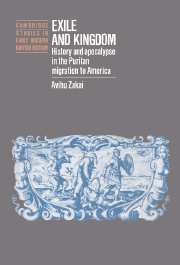Book contents
- Frontmatter
- Contents
- Acknowledgments
- Introduction
- 1 The creation of sacred time
- 2 The creation of sacred space I
- 3 The creation of sacred space II
- 4 The creation of sacred space III
- 5 The creation of sacred errand
- 6 The creation of a sacred Christian society
- 7 The creation of a holy Christian commonwealth
- Index
- Cambridge Studies in Early Modern British History
5 - The creation of sacred errand
Exile and Kingdom: the redemptive significance of the Puritan Errand into the Wilderness
Published online by Cambridge University Press: 18 September 2009
- Frontmatter
- Contents
- Acknowledgments
- Introduction
- 1 The creation of sacred time
- 2 The creation of sacred space I
- 3 The creation of sacred space II
- 4 The creation of sacred space III
- 5 The creation of sacred errand
- 6 The creation of a sacred Christian society
- 7 The creation of a holy Christian commonwealth
- Index
- Cambridge Studies in Early Modern British History
Summary
ESCHATOLOGY AND APOCALYPSE OF THE PURITAN ERRAND INTO THE WILDERNESS OF AMERICA
Any discussion of the Puritan mission in the settlement of America, clearly must take into account not only Perry Miller's famous essay “Errand into the Wilderness,” but the revisions of his arguments as well. Such discussion ought to deal, for example, with the important contention that “the fathers may have founded the colonies, but the sons invented New England.” This powerful argument, along with other attempts to revise Miller's thesis about the presence of a well-defined and highly coherent founding Puritan errand in the settlement of New England, has led some critics to accuse later generations of Puritans as having created the “myth of New England,” or even to the bold assertion that
had the founders of Massachusetts actually intended an overarching Errand, surely it would have been a persistent theme in their many explicit statements of purpose, and especially in the tabulation of “arguments” by Winthrop, Cotton, Thomas Shepard and Richard Mather, and others. But it was not.
This important contention of modern Puritan historiography, that a conscious “invention” of New England and a deliberate fashioning of its “myth” was perpetrated by the Puritans of the second generation, inevitably raises serious suspicions about the very existence of any founding Errand on the part of the first generation of American Puritans who emigrated from England to New England during the 1620s and 1630s.
- Type
- Chapter
- Information
- Exile and KingdomHistory and Apocalypse in the Puritan Migration to America, pp. 156 - 206Publisher: Cambridge University PressPrint publication year: 1991



